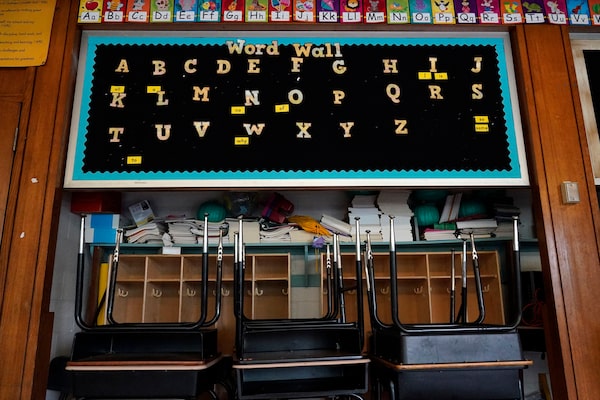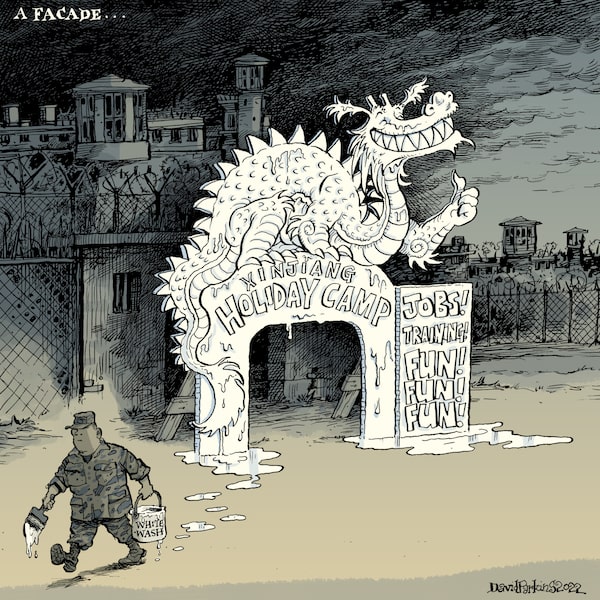Good morning,
Two years after the spread of COVID-19 prompted administrators around the world to close schools, students in the U.S. have seen some of the worst drops in test scores on record. Testing of thousands of nine-year-old students in the U.S. at the beginning of this year by the National Assessment of Educational Progress showed a fall in reading scores relative to 2020 that is the largest since 1990, and the first decline in math scores.
The tumble in performance, released in a new report this week, was far more acute for students in racialized communities and those already struggling in school. Black students saw a 13-point fall in math, compared with six points for white children. Hispanic students also had an outsized decline.
Although data are scarcer in Canada, a University of Alberta study found that students in Grades 1 and 2 in the Edmonton area performed, on average, eight months to a full year below grade level on reading tasks by the end of the 2020-21 academic year. “I don’t think that we have a generation that’s lost,” said Thurston Domina, an education scholar at the University of North Carolina. “But I think we have a real challenge on our hands.”
Read more:
- Canada risks losing its edge on international student recruitment over visa delays, universities say
- Immigration Minister says his department has shifted focus to international student visas as many await last-minute approval
- Canadian universities are rushing to address critical shortage of student housing

Desks are stacked together in a classroom at Chalmers Elementary school in Chicago on July 13, 2022.Nam Y. Huh/The Associated Press
This is the daily Morning Update newsletter. If you’re reading this on the web, or it was forwarded to you from someone else, you can sign up for Morning Update and more than 20 other Globe newsletters on our newsletter signup page.
Fifty years after Munich massacre, Israeli victims’ families say deal with Germany is a step toward justice
Ankie Spitzer entered the bloodstained, ransacked apartment in the Olympic Village in Munich a day after the massacre. On Sept. 5, 1972, Israeli athletes and coaches had been attacked and held hostage by the Palestinian terrorist group Black September. It ended with Spitzer’s husband, fencing coach Andrei Spitzer, and 10 other Israelis dead.
Soon after the massacre, German officials imposed a wall of silence. There was no public inquiry, no trial for the three surviving terrorists, and the victims’ families were made to wait 20 years before receiving the first formal accounts of what had happened. For half a century the families campaigned for the governments to release the archives, take responsibility and pay compensation.
Just shy of the attack’s 50th anniversary and amid mounting international pressure, the city, state and federal governments agreed to meet those demands on Tuesday night. Reaching an accord “would mean the world to me,” Spitzer said a few days before the announcement. “Because I would know that I cleaned the table, and I don’t pass the struggle on to my children and to the children of my children.”
First “bivalent” COVID-19 vaccine approved in Canada targets the Omicron variant
Health Canada has approved an updated version of Moderna’s COVID-19 vaccine that specifically targets the Omicron variant, making it the first “bivalent” COVID-19 vaccine approved in this country. The federal department has authorized the use of this updated formulation as a booster shot, and it said that the new vaccine is also effective against more recent Omicron subvariants.
A study comparing Moderna’s “bivalent” vaccine with its original vaccine found that the updated formulation offers better protection against Omicron BA.1, the initial strain of the Omicron variant of COVID-19. Canada is receiving 10.5 million doses of the vaccine, known as “Spikevax Bivalent,” later this month, Minister of Health Jean-Yves Duclos said during a news conference Thursday. Asked when the average Canadian will be able to access the updated booster, Duclos said “supply is not an issue.”
Read more:
Got a news tip that you’d like us to look into? E-mail us at tips@globeandmail.com Need to share documents securely? Reach out via SecureDrop
Also on our radar
Ready to go back to the office? Employers and workers are divided over the fate of remote work: In most parts of the country, life has resumed some semblance of pre-pandemic normalcy – gyms are open and filled with people; concert arenas, sports centres and movie theatres are packed. But the office has been an exception, and many buildings in the downtown cores of major cities are still largely empty. And by some accounts, employees are not reacting well to being forced back into the office.
Ukraine’s millionaires vow to fight ‘for the existence of our nation’: “It is our land and we will fight for it,” said Vsevolod Kozhemiako, a 50-year-old businessman. The multimillionaire, whose US$100-million fortune earned him the 88th spot on the Forbes list of the 100 wealthiest Ukrainians, has started his own battalion, leading 200 volunteers in the war effort. Kozhemiako is proud of the unit and says he’ll fight until Ukraine emerges victorious.
Shopify adds to recent layoffs while boosting pay for many remaining employees: About 70 employees have been let go in August, according to three people familiar with the situation. The Globe and Mail is not identifying the sources because they were not authorized to discuss the matter publicly. They received similar severance packages to those of the employees let go in July, but they did have to sign non-disclosure agreements in order to receive their severance packages, the sources said.
Twitter unveils long-awaited edit button, and Canadian subscribers can try it first: The feature will let subscribers edit their tweets, add or remove tags and reorder attached media “a few times” within 30 minutes of publishing. Tweets will be marked with an icon and label noting they have been modified and users will have access to a time-stamped history of the changes. The feature will become available to Canadian subscribers of Twitter Blue, the company’s paid subscription service, for testing as early as late September.
Feist exits Arcade Fire tour over Win Butler allegations: ‘I can’t continue’: Canadian musician Leslie Feist says she’s leaving Arcade Fire’s tour due to sexual misconduct allegations against lead singer Win Butler. Feist had been booked as the opening act on the European leg of the indie rock band’s tour in support of their latest album WE, which kicked off in Dublin on Tuesday.
Morning markets
World stocks were heading for a 3 per cent loss on the week while the dollar hit 24-year highs against the yen for a second day on Friday ahead of key U.S. jobs data, as investors brace for aggressive rate hikes from the Federal Reserve. Just after 5:45 a.m. ET, Britain’s FTSE 100 was up 0.59 per cent. Germany’s DAX and France’s CAC 40 gained 1.25 per cent and 0.35 per cent, respectively. In Asia, Japan’s Nikkei finished down 0.04 per cent. Hong Kong’s Hang Seng lost 0.74 per cent. New York futures were lower. The Canadian dollar was trading at 76.06 US cents.
What everyone’s talking about
Can our economic warfare defeat Putin’s actual warfare?
“The effort to economically isolate Russia, after all, has also hurt the Western world, creating this year’s crises of soaring energy costs and contributing to broader inflation. Meanwhile, higher oil and natural gas prices have boosted Moscow’s foreign-currency reserves. This has led some to claim that the sanctions have backfired.” – Doug Saunders
Medical assistance in dying is a right that needs more limits
“Should this otherwise healthy woman, who we’ll call “C,” be allowed to apply for a medically assisted death? C’s story is fictional, but it is inspired by real cases. It was featured in the final report of an expert panel appointed by the federal government to make recommendations on how Canada can safely expand its assisted-dying regime to include patients whose sole illness is a mental disorder.” – The Editorial Board
Rather than restoring seriousness to power, Britain’s Conservatives have opted for more cake
“The ruling creed is unmistakable: ‘cakeism,’ a doctrine of such stupidity that it is about to propel another right-wing mediocrity, Liz Truss, to the highest office in the land. Cakeism – a nonsense of that half-eaten scone of a man, Boris Johnson – emerged from his Brexit negotiations, when the Prime Minister promised that his country could have its cake and eat it, too.” – Tom Rachman
Today’s editorial cartoon

David Parkins/The Globe and Mail
Living better
Have digital payments consigned the overstuffed wallet to history?
Deepak Anand still remembers leaving the house with a stack of coupons, punch cards, membership cards, cash and a multitude of credit cards, all crammed into an overstuffed wallet. Those days are long behind him.
It’s all on his phone now. The only card he carries with him these days is his driver’s licence, though he hopes to see that go digital soon too. Many Canadians also have thinner wallets these days. According to a study conducted by Payments Canada, 79 per cent of all transactions in 2020 were completed digitally, with online transfers growing by 48 per cent and e-commerce payments increasing by 20 per cent. Read more about what it means to go digital with our money.
Moment in time: Sept. 2, 1642

Long view of London From Bankside, 1647 (detail) by Wenceslaus Hollar offers images of the second Globe theatre and the Bear Garden, but with the names of the theatres interchanged.Wenceslaus Hollar/Handout
London’s theatres are ordered to close
It wasn’t plague but politics that led London theatres to be shuttered for the longest period in their history. On this day in 1642, the first year of the series of conflicts known as the English Civil War, the Puritan-led Parliament issued an order for stage plays to cease amid “the distracted Estate of England, threatened with a Cloud of Blood.” The official reason was that “Spectacles of Pleasure, too commonly expressing lascivious Mirth and Levity” were not in tune with “Times of Humiliation.” Playhouses, however, were also potential gathering places for Royalists and places where public riots might be sparked. Actors petitioned Parliament to reopen the theatres in 1643, arguing that they had “purged our stages of all obscene and scurrilous jests.” But the Puritan war on pleasure only escalated – with the Globe Theatre demolished in 1644 and stricter rules against plays and punishments for players introduced later. Some actors are said to have defied the laws and performed underground, in private homes, in pubs, on the streets, but it would take until the restoration of the monarchy in 1660 for London’s playhouses to reopen – whereupon women were permitted to perform on professional stages for the first time. J. Kelly Nestruck
Read today's horoscopes. Enjoy today's puzzles.
If you’d like to receive this newsletter by e-mail every weekday morning, go here to sign up. If you have any feedback, send us a note.